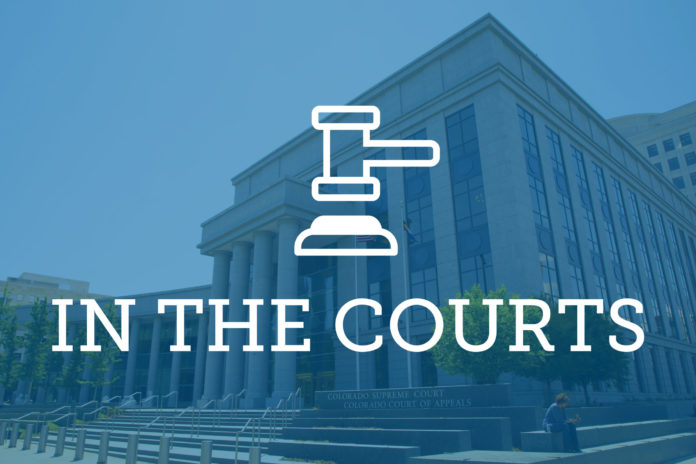
Editor’s Note: Law Week Colorado edits court opinion summaries for style and, when necessary, length.
Ernie Crawley appealed the postconviction court’s order denying, without a hearing, his Rule of Criminal Procedure 35(c) motion requesting an extended proportionality review of his sentence.
The Colorado Court of Appeals, in its abbreviated proportionality review, discovered a threshold question that hasn’t been addressed in a published appellate opinion: Is second-degree murder in violation of Section 18-3-103(1)(a) of the Colorado Revised Statutes per se grave or serious under the Colorado Supreme Court case Wells-Yates v. People?
The appeals court concluded it is per se grave or serious and Crawley’s sentence wasn’t disproportionately harsh.
The appeals court affirmed the postconviction order, albeit on different grounds.
Estate of McClain v. Killmer, Lane & Newman, LLC Attorneys and Clients
Sheneen McClain and the Estate of Elijah McClain appealed the district court’s judgment awarding attorney fees to Killmer, Lane & Newman, LLP.
In this case, the Colorado Court of Appeals identified the factors a court should apply to determine whether a lawyer should be awarded a fee notwithstanding the existence of a concurrent conflict of interest. The appeals court also identified factors a court should consider in assessing a reasonable fee when the lawyer is terminated for cause, but the lawyer’s conduct hasn’t resulted in a complete forfeiture of the right to collect a fee.
According to the opinion, KLN had a concurrent conflict of interest, which wasn’t disclosed or waived, from the outset of its engagement in the case. Moreover, KLN didn’t have a fee agreement with the estate and didn’t disclose the need for associated counsel or how such counsel would be paid.
Nevertheless, the district court concluded the gravity and timing of KLN’s wrongful conduct was minimal because it didn’t prejudice McClain’s ability to recover a large percentage of the settlement proceeds.
While the district court properly recognized there were mitigating considerations, given the timing and significance of the conflict, the appeals court couldn’t characterize it as minimal and concluded the circumstances associated with this factor weight slightly in favor of finding a forfeiture of KLN’s right to charge McClain a fee for its work in the federal litigation.
On the willfulness aspect, the findings in the case support the district court’s conclusion that KLN’s misconduct wasn’t willful, according to the opinion. But the appeals court also acknowledged KLN had a vested interest in representing all the parties because doing so would maximize the total sum from which its 40% contingent fee would be calculated.
And despite the clear conflicts that existed by August 2020, KLN continued to represent all parties until McClain terminated its representation of her in January 2021.
The appeals court concluded the consideration involved in this factor weigh slightly, but not heavily, in favor of forfeiture.
On the factor of the value of the lawyer’s work for the client, the opinion noted that by all accounts KLN provided extraordinary legal services while representing McClain and the estate. Based on these findings, the appeals court determined the district court didn’t err by concluding KLN’s work on behalf of McClain and the estate wasn’t substantially affected by the conflict of interest, and that factor weighs heavily against forfeiture.
On the factor of other threatened or actual harm to the client, the opinion noted KLN’s conflict of interest was most readily apparent in the context of the apportionment of settlement funds.
Because KLN was unable to assist the parties on these issues, McClain incurred additional fees to obtain probate counsel. Nonetheless, the district court was able to fashion a remedy that compensated McClain for those and other losses. Factoring these costs and other intangible costs to McClain, the appeals court concluded the considerations embodied in this factor didn’t weigh significantly in favor of, or against, forfeiture.
On the adequacy of other remedies consideration, the appeals court concluded it is possible to fashion an equitable remedy that recognized the significance of KLN’s wrongful conduct, deters such wrongful conduct in the future and still results in a fair and equitable remedy for the parties. The appeals court concluded this factor weighs heavily against complete fee forfeiture.
Balancing these considerations, the appeals court concluded the district court didn’t err when it determined a complete forfeiture of any fee wasn’t warranted. In reaching this conclusion, the appeals court rejected McClain and the estate’s argument that its existing precedent, or nonbinding precedent from other jurisdictions, counsels a contrary conclusion.
The appeals court affirmed the district court’s judgment holding KLN didn’t forfeit its right to receive any fee from McClain. It reversed the portion of the judgment awarding attorney fees in favor of KLN and Rathod Mohamedbhai. It awarded attorney fees in favor of KLN and against McClain in the amount of $1,433,420 for KLN’s work on behalf of McClain in the federal litigation. The appeals court also affirmed the district court’s award to KLN of attorney fees in the amount of $140,000 for the Falck litigation, with a $33,282.60 deduction. Because the $140,000 fee was previously distributed to KLN, the $33,282.60 deduction must be subtracted from KLN’s fee award against McClain. After deduction, the total judgment in favor of KLN and against McClain is $1,400,137.40.

